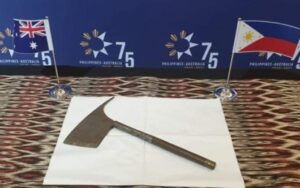By Joyce Ann L. Rocamora (PIA)

MANILA — The Australian government has returned a recovered mid-20th century axe used for woodcarving and hunting in the Ifugao communities in northern Luzon, the Philippine Embassy in Australia said Tuesday.
Acting First Assistant Secretary Greg Cox of the Australian Office for the Arts turned over the cultural artifact to Ambassador Ma. Hellen de la Vega in a ceremony in Canberra last November 19.
The Embassy said the Igorot axe was intercepted in June last year by the Australian Border Force (ABF) upon entry into Australia from the United States.
The ABF alerted the Cultural Property section of the Office for the Arts, which then undertook the investigation.
After consultation with an expert on Asian art history and curatorial studies, and a restitution request from the Philippine government, the object was seized so it could be returned.
It was found that the axe had been removed from the Philippines in breach of Republic Act 10066 or the National Cultural Heritage Law, which prevents cultural objects from leaving the country without a permit from the National Museum.
National Commission for Culture and the Arts (NCCA) Chairperson Arsenio Lizaso, in a message read by de la Vega, underscored that “cultural heritage is priceless.”
“It is a reflection of the value systems and traditions transmitted from generation to generation. It helps us understand who we were, who we are and who we may become,” he said.
De la Vega, meanwhile, thanked the Australian government for its efforts to return the artifact, also noting that 2021 marks the Year of Filipino Pre-Colonial Ancestors.
She added that both the Philippines and Australia, which celebrate 75 years of diplomatic relations this year, have a rich indigenous heritage that continues to shape and influence our people and our future. (Source: PNA)





